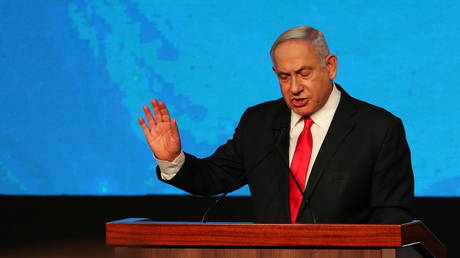
Israel’s High Court of Justice has ruled that Prime Minister Benjamin Netanyahu shouldn’t get involved in selecting high-ranking law enforcement and justice officials while he himself is on trial for “serious offences.”
In their decision on Thursday, the judges sided with Attorney General Avichai Mandelblit, who earlier laid out conflict of interest rules regarding Netanyahu’s situation. Mandelblit insisted that the PM must be prevented from appointing officials who would have the power to influence the probe against him.
“The reality in which a prime minister is serving while an indictment is pending against him for serious offenses in the area of personal integrity is an exceptional situation that requires extreme adherence to the principle of prohibiting a person in public office from being in a situation of conflict of interest,” the court ruling read.
Netanyahu, who earlier said that the attorney general’s opinion wasn’t binding for him, wouldn’t be able to ignore the ruling of the high court.
However, the judges declined a petition, which urged for the PM’s close ally – Public Security Minister Amir Ohana – to also be prevented from getting involved with high-profile staffing decisions.
The court clarified that the conflict of interest arrangement was designed personally for Netanyahu, urging Ohana and other ministers to refrain from discussing possible appointments with the PM.
Netanyahu, who has been in power in Israel since 2009, was indicted on charges of fraud, bribery and breach of public trust in November over accusations he accepted expensive gifts from business contacts and made deals with media bosses for favorable coverage.
The prime minister’s main political rival, acting Justice Minister Benny Gantz, reacted to the high court’s ruling by saying that Netanyahu had been “immersed up to his neck in conflict of interest” and that was the reason for his refusal to appoint a permanent state attorney or justice minister. Gantz called upon the parties, who would get Knesset seats after Tuesday’s election, to unite and finally oust the PM.
The trial of the prime minister, which was postponed due to what was the fourth general election in the country in two years, is scheduled to continue on April 5.
Israel’s Central Elections Committee has so far counted 98.5% of votes, with Netanyahu’s Likud party winning with 30 seats and beating the nearest rival by 13 seats. However, the election results likely won’t allow the PM to gain a majority in the 120-member Knesset. Pro-Netanyahu forces are currently projected to claim 52 seats, with a diverse group of opposition parties that resist him looking at 57 spots in the Israeli legislature.
Think your friends would be interested? Share this story!




